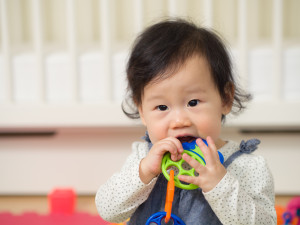 Nothing is more upsetting for a loving parent or caregiver than to see their baby in pain or discomfort from teething. And the accompanying crankiness and drooling is no joy, either! Fortunately, there are some simple steps you can take that may greatly minimize the agony from this difficult time, while making it a more enjoyable process for you as well. Here are some top teething tips.
Nothing is more upsetting for a loving parent or caregiver than to see their baby in pain or discomfort from teething. And the accompanying crankiness and drooling is no joy, either! Fortunately, there are some simple steps you can take that may greatly minimize the agony from this difficult time, while making it a more enjoyable process for you as well. Here are some top teething tips.
What Happens When Babies Are Teething?
Each individual baby will be different in their teething timeline and habits, but typically a baby gets their first baby tooth (and begins the process of teething) at approximately 6 months. However, depending on several factors, this can be as young as 3 months or as late as 14 months. Heredity plays a part, as does whether or not your baby was a preemie (they tend to teeth a bit later).
Teething Symptoms — and What to Do About Them
As with timing, teething symptoms can also vary greatly between babies. For some babies, symptoms might arrive weeks before the tooth makes its appearance. Other babies might have no problem whatsoever. Symptoms include the baby’s desire to gnaw on various objects, excessive drooling, discomfort and pain, swollen and puffy gums, excessive fussiness (especially evident at night) or a pulling on the ear, which might not be an ear infection but rather jaw pain that moves to the ear canal. There can also be a change in the baby’s eating habits, such as the desire to nurse or be bottle fed rather than eat solid foods, even if they had been eating them before. This might happen because a utensil may be painful to sore gums. Any pain may also make them pull away from a bottle or breastfeeding.
How to Sooth Sore Gums for Teething Babies
If your baby is experiencing teething pain, there are some simple teething tips that may help them to be more comfortable:
- Administer a Gentle Gum Massage – Using your clean finger or a moistened soft gauze pad, try rubbing their gums. This gentle pressure might ease their discomfort.
- Try a Teething Ring – Firm, solid rubber is the best, as it’s the most durable. You can give them a bottle to teeth on, but always fill it with pure water. Prolonged contact with juice, formula or milk, since these liquids contain sugars, can cause teeth to decay.
- Chill Out – Place a cold spoon, chilled teething ring or cold washcloth against baby’s gums for a soothing effect. Don’t use anything frozen, as extreme cold may be damaging.
- Keep Baby Drool-Free – Excessive drooling may cause skin irritation, so try to keep the chin clear of drool with a clean cloth. A water-based lotion or cream can also help.
- Try Baby Pain Meds – For especially tricky teething problems (such as extreme crankiness), there are over-the-counter pain relievers that are safe to use, though you should always use one that’s made for babies and stick to the recommended dosage. Ibuprofen and Acetaminophen are recommended, as is a topical oral anesthetic.
What Not to Give a Teething Baby
Parenting Magazine also recommends distraction as a smart tip to soothe teething discomfort, to get the baby’s mind off their mouth. But they also recommend that you don’t use hard foods (even frozen bananas or carrots), because of the danger of small pieces coming loose during gnawing and possibly causing a choking hazard. A little brandy on baby’s swollen gums is also a no-no, since even a small amount of alcohol can be very dangerous for a baby. Save the brandy for yourself!







Leave a Reply